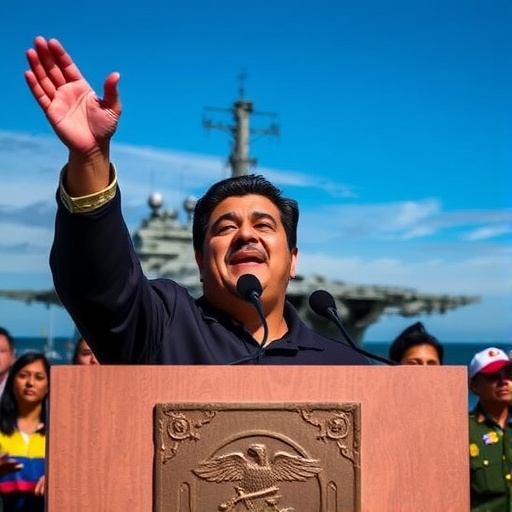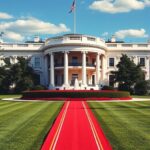Venezuela‘s Maduro Accuses U.S. of Fabricating War as Aircraft Carrier Nears Borders, Sparking Global Alarm
In a blistering address from Caracas, Venezuelan President Nicolas Maduro has leveled explosive accusations against the United States, claiming Washington is orchestrating a fabricated war to destabilize his government. The rhetoric comes at a precarious moment, with a U.S. aircraft carrier group steaming toward Venezuelan waters, heightening fears of an unintended escalation in the already fraught Venezuela-U.S. relations.
Maduro’s claims, delivered during a nationally televised speech on Thursday evening, paint a picture of imperial aggression, with the socialist leader vowing that his nation will not bow to what he calls “Yankee imperialism.” This outburst follows reports of increased U.S. military activity in the Caribbean, including the deployment of the USS Gerald R. Ford, a nuclear-powered aircraft carrier capable of launching dozens of fighter jets. As diplomatic tensions simmer, analysts warn that the situation could spiral into a broader regional crisis, reminiscent of Cold War-era standoffs.
The immediate trigger appears to be a series of U.S. naval exercises in international waters off the coast of Venezuela, which Maduro’s administration has branded as provocative saber-rattling. “They are inventing a war that doesn’t exist to justify their invasion,” Maduro declared, flanked by military officials in the presidential palace. His words have reverberated across Latin America, drawing sharp rebukes from allies like Russia and Cuba, while prompting cautious statements from the Biden administration.
To understand the gravity of this moment, it’s essential to delve into the layers of geopolitical friction that have long defined U.S.-Venezuelan interactions. With Venezuela‘s vast oil reserves—the largest proven in the world—serving as a persistent flashpoint, the current standoff is not isolated but part of a decade-long saga of sanctions, proxy conflicts, and ideological clashes.
Maduro’s Fiery Denunciation Echoes Through Caracas Streets
President Nicolas Maduro’s speech was nothing short of theatrical, broadcast live to millions of Venezuelans grappling with economic hardship and political division. Standing before a massive portrait of revolutionary leader Hugo Chávez, Maduro accused the U.S. of “fabricating evidence of threats” to justify military intervention. “This is not a drill; this is a direct assault on our sovereignty,” he proclaimed, his voice rising in cadence as crowds outside the Miraflores Palace chanted anti-imperialist slogans.
The Venezuelan leader didn’t mince words, linking the alleged plot to recent U.S. sanctions that have crippled the country’s economy. According to official figures from the Venezuelan Ministry of Foreign Affairs, these measures have cost the nation over $130 billion since 2015, exacerbating hyperinflation that peaked at 1.7 million percent in 2018. Maduro claimed that the aircraft carrier deployment is the latest ploy in a “regime change” agenda, echoing unsubstantiated reports of U.S.-backed opposition plots.
Supporters of Maduro, including key figures in the United Socialist Party of Venezuela (PSUV), rallied behind his narrative. Vice President Delcy Rodríguez echoed the sentiment in a tweetstorm, stating, “The empire’s warships won’t intimidate us. Venezuela stands united against aggression.” However, critics within the country, including opposition leader María Corina Machado, dismissed the accusations as a distraction from domestic failures, such as widespread food shortages and a crumbling healthcare system. Machado urged international mediators to intervene, warning that Maduro’s bellicose tone could isolate Venezuela further on the global stage.
Public reaction in Caracas was polarized. Pro-Maduro marches clogged the capital’s avenues, with participants waving flags and burning effigies of U.S. President Joe Biden. In contrast, quieter dissent brewed in middle-class neighborhoods, where residents expressed fatigue over the endless cycle of confrontation. A poll conducted by the independent firm Datanalisis last month showed that 62% of Venezuelans fear military escalation, underscoring the high stakes of the current rhetoric.
U.S. Aircraft Carrier Deployment Fuels Speculation of Hidden Agendas
The centerpiece of the escalating drama is the USS Gerald R. Ford, the U.S. Navy’s most advanced aircraft carrier, which departed from Norfolk, Virginia, last week for what the Pentagon describes as “routine freedom of navigation operations” in the Caribbean Sea. Carrying up to 75 aircraft, including F-35 stealth fighters and E-2 Hawkeye surveillance planes, the carrier strike group represents a formidable show of force, with over 5,000 sailors and marines aboard.
U.S. officials have downplayed the move, insisting it’s part of scheduled exercises to ensure maritime security amid rising concerns over drug trafficking and illegal fishing in the region. A spokesperson for the U.S. Southern Command (SOUTHCOM) told reporters, “Our presence is defensive and in full compliance with international law. We have no intention of engaging in hostilities with Venezuela.” Yet, the timing—mere days after Maduro’s disputed re-election in July—has raised eyebrows. Satellite imagery from the Venezuelan Armed Forces shows the carrier group within 200 nautical miles of the Paraguaná Peninsula, a key oil-producing area.
Experts on U.S. military strategy point to broader implications. Dr. Evan Ellis, a Latin America specialist at the U.S. Army War College, noted in an interview, “This deployment signals deterrence against potential alliances between Venezuela and adversarial powers like Iran or China, who have deepened ties with Maduro’s regime.” Indeed, recent reports indicate Iranian oil tankers docking in Venezuelan ports, evading U.S. sanctions, while Chinese investments in infrastructure have topped $60 billion since 2007.
The carrier’s approach isn’t without precedent. In 2008, a similar U.S. naval presence prompted Chávez to mobilize troops along the border, leading to a brief spike in oil prices. Today, with global energy markets volatile due to the Russia-Ukraine war, any disruption in Venezuelan exports—currently hovering at 700,000 barrels per day—could send shockwaves through Wall Street. Analysts from the International Energy Agency warn that even a perceived threat might deter investors, further strangling Maduro’s cash-strapped government.
Roots of Diplomatic Tensions Trace Back to Oil and Ideology
The current diplomatic tensions between Venezuela and the U.S. are deeply rooted in a history of mutual suspicion, dating back to the early 2000s when Hugo Chávez rose to power on a wave of anti-American sentiment. Chávez’s nationalization of oil assets in 2007, which included expropriating ExxonMobil facilities, marked a turning point, leading to the first wave of U.S. sanctions under the George W. Bush administration.
Under Maduro, who succeeded Chávez in 2013, relations have deteriorated further. The U.S. has imposed over 300 sanctions targeting Venezuelan officials, state-owned PDVSA, and even cryptocurrency ventures aimed at bypassing financial restrictions. In 2019, the Trump administration recognized opposition figure Juan Guaidó as interim president, a move that Maduro decried as a “coup attempt.” This period saw heightened U.S. military flyovers and joint exercises with Colombia, Venezuela‘s neighbor and a staunch U.S. ally.
Statistics paint a stark picture of the fallout. The United Nations estimates that U.S. sanctions have contributed to a 75% contraction in Venezuela‘s GDP since 2013, displacing over 7.7 million refugees—the largest exodus in Latin American history. Maduro has retaliated by expelling U.S. diplomats and aligning with non-Western powers; Russia, for instance, has provided military advisors and S-300 air defense systems to bolster Venezuelan forces.
Ideological divides exacerbate the rift. Maduro’s Bolivarian Revolution emphasizes resource sovereignty and multipolarity, clashing with U.S. promotion of democracy and free markets. Recent events, such as the U.S. indictment of Maduro on drug trafficking charges in 2020, have only widened the gulf. “This is hybrid warfare,” argued Venezuelan Foreign Minister Yván Gil in a statement to the Organization of American States (OAS), accusing Washington of using economic pressure to provoke internal unrest.
Regional dynamics add complexity. Colombia, under President Gustavo Petro, has sought dialogue with Maduro to address migration flows, while Brazil’s Lula da Silva has called for an end to sanctions. Yet, the presence of the aircraft carrier has prompted Brazil to increase border patrols, fearing spillover effects.
International Allies and Critics Weigh In on the Standoff
The world is watching closely as diplomatic tensions mount, with reactions ranging from condemnation to calls for restraint. Russia, Venezuela‘s staunchest backer, issued a stern warning through its Foreign Ministry: “Any aggressive actions by the U.S. will be met with countermeasures.” Moscow has supplied Venezuela with $6 billion in loans and military hardware, viewing the crisis as a proxy battle against NATO expansion.
Cuba, another ideological ally, mobilized its diplomatic corps, with President Miguel Díaz-Canel tweeting solidarity: “Venezuela is not alone; the blockade must end.” In contrast, the European Union urged de-escalation, with High Representative Josep Borrell stating, “Military posturing risks unnecessary conflict in a volatile region.” China, Venezuela‘s largest creditor, remained measured, emphasizing “peaceful resolution” while protecting its $19 billion in outstanding loans.
Within Latin America, the response is fractured. The left-leaning Community of Latin American and Caribbean States (CELAC) convened an emergency session, where Mexican President Andrés Manuel López Obrador proposed mediation. However, right-leaning governments like those in Chile and Uruguay aligned more closely with U.S. concerns over human rights abuses in Venezuela, including the arbitrary detention of over 15,000 political prisoners since 2014, per Human Rights Watch.
U.S. domestic voices are divided too. Progressive lawmakers like Senator Bernie Sanders criticized the aircraft carrier deployment as escalatory, while hawks in Congress, such as Senator Marco Rubio, defended it as necessary to counter Maduro’s authoritarianism. A recent Gallup poll indicates that 55% of Americans support maintaining pressure on Venezuela, though only 28% favor military involvement.
Non-governmental organizations have amplified the humanitarian angle. Amnesty International highlighted the plight of 96,000 indigenous people displaced by border skirmishes, urging both sides to prioritize dialogue over confrontation.
As the U.S. military assets linger in the region, the path forward remains uncertain. Diplomatic channels, though strained, offer glimmers of hope—backchannel talks mediated by Norway have resumed, focusing on sanction relief in exchange for electoral reforms. Yet, with Maduro’s term secured amid fraud allegations and U.S. elections looming in 2024, experts predict prolonged uncertainty. A miscalculation could ignite a conflict with far-reaching consequences, from oil price surges to refugee waves overwhelming neighbors. For now, the world holds its breath, hoping rhetoric gives way to reason before the aircraft carrier‘s shadow darkens Venezuelan shores further.
In the coming weeks, watch for UN Security Council debates and potential OAS resolutions that could either defuse or inflame the situation. Stakeholders from energy firms to human rights advocates are mobilizing, underscoring that the stakes transcend Venezuela‘s borders, potentially reshaping hemispheric security for years to come.








